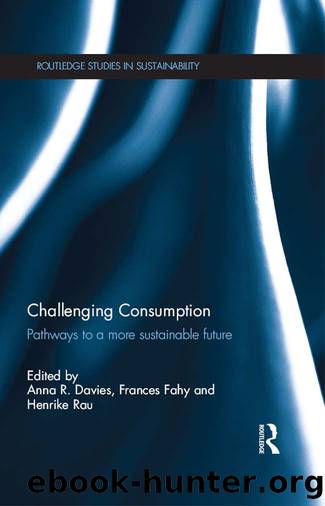Challenging Consumption by Unknown

Author:Unknown
Language: eng
Format: epub
ISBN: 978-1-136-73504-2
Publisher: Taylor and Francis
Discussion and conclusions
While the technology to allow individuals to work from home has been widely available for some time now, there is continuing reluctance and apprehension on the part of many employers, and indeed employees, to embrace the practice of telework. Whilst it must be stated that many existing teleworkers express satisfaction with their arrangements, what is largely neglected in much of the research and discourses on telework is the private/work dualism, that is, the multifaceted domestic and social interactions individuals struggle with when working from home. Merely promoting the apparent environmental sustainability merits of telework ignores the potential conflict between the other two pillars of sustainability (economic and social). Moreover, the environmental benefits of telework are often uncritically accepted without due attention to social and cultural dimensions, or indeed in the absence of robust empirical evidence. As this research has shown, the environmental impacts of telework are by no means clear-cut, given the emergence of new resource-intensive (mobility) practices as a result of telework. The cost of increased domestic resource use arising from working from home is also largely shouldered by teleworkers themselves, raising important equity questions.
Ecological Modernisation (EM) is an attempt to move environmental protection debates away from the confrontational positions of the past, within the confines of existing growth-centric economic models of development and production. But EM discourses are wide and varied and shift between shallow techno-optimist positions and deep structural change approaches to environmental protection. In this chapter, a typology of four key themes that underpin the deeper aspects of EM thinking was presented, in line with existing debates and literature on the subject. Whilst there is some evidence of the rhetoric of deep EM in telework public discourses, little in the way of practical application and implementation of such radical change approaches is apparent. Instead, an approach suggestive of neoliberal environmentalism is evident, in which individual organisations are given absolute freedom over any such working arrangements, leading to a stagnation of the practice overall.
The lack of any concrete policy or regulation in relation to telework in Ireland is leading to haphazard and confused working arrangements, confounding already complicated work and domestic commitments. Given this legislative and regulatory vacuum, policy-makers and key decision-makers must assume that technology, with respect to its inherent nature, is value-neutral and autonomous (Huesemann and Huesemann, 2011), bringing about only positive impacts and consequences. Many such decision-makers adhere to an (over)optimistic understanding of the power of technology in terms of its social and environmental good, and often hold an uncritical acceptance of innovation and development.
Telework lacks the necessary oversight essential to legitimise it for both employers and employees. In the Irish case, an existing neoliberal state, chronic car-dependency and a lack of telework guideline or schemes reflect classic shallow EM thinking. The laissez-faire approach adopted by policy-makers allows employers to retain ultimate discretionary powers over the success or failure of telework arrangements and schemes. Further, many employers fail to truly appreciate or recognise the real issues and concerns of teleworkers, which is leading to ad-hoc and disorganised arrangements to the detriment of this way of working.
Download
This site does not store any files on its server. We only index and link to content provided by other sites. Please contact the content providers to delete copyright contents if any and email us, we'll remove relevant links or contents immediately.
Kathy Andrews Collection by Kathy Andrews(11819)
The remains of the day by Kazuo Ishiguro(8986)
Spare by Prince Harry The Duke of Sussex(5186)
Paper Towns by Green John(5185)
The Body: A Guide for Occupants by Bill Bryson(5087)
Industrial Automation from Scratch: A hands-on guide to using sensors, actuators, PLCs, HMIs, and SCADA to automate industrial processes by Olushola Akande(5058)
Machine Learning at Scale with H2O by Gregory Keys | David Whiting(4302)
Be in a Treehouse by Pete Nelson(4046)
Never by Ken Follett(3944)
Harry Potter and the Goblet Of Fire by J.K. Rowling(3851)
Goodbye Paradise(3804)
The Remains of the Day by Kazuo Ishiguro(3402)
Into Thin Air by Jon Krakauer(3391)
Fairy Tale by Stephen King(3378)
The Cellar by Natasha Preston(3339)
The Genius of Japanese Carpentry by Azby Brown(3299)
120 Days of Sodom by Marquis de Sade(3270)
Reminders of Him: A Novel by Colleen Hoover(3102)
Drawing Shortcuts: Developing Quick Drawing Skills Using Today's Technology by Leggitt Jim(3079)
